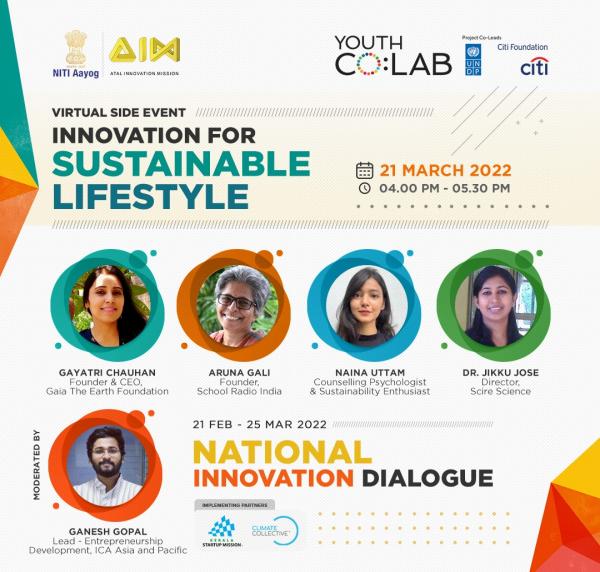
In 2017, United Nations Development Programme (UNDP) Asia-Pacific and Citi Foundation co-created Youth Co:Lab, a multi-dimensional and multi-level response to tackle the challenges faced by youth by positioning them at the front and centre and finding solutions to today’s most pressing problems. UNDP India and Atal Innovation Mission, NITI Aayog (National Institution for Transforming India) collaborated to strengthen the youth-led innovation and social entrepreneurship ecosystem through Youth Co:Lab India.
As a part of the fourth edition of Youth Co:Lab India, the National Innovation Dialogue 2022, with the theme Climate Action and Innovation, was organised in a series of events throughout March. It focused on the theme of climate action and climate entrepreneurship and was implemented by Kerala Startup Mission and Climate Collective Foundation. Through this dialogue, Youth Co:Lab India is trying to engage sustainability enthusiasts, students, aspiring entrepreneurs, and innovators through workshops, panel discussions, round tables, art performances and jobs fairs to establish a common agenda of capacity building, strengthening the coalition and creating an enabling ecosystem.
Mr. Ganesh Gopal, Lead-Entrepreneurship Development, ICA-AP moderated the online panel discussion on 'Innovation for Sustainable Lifestyle'. The virtual event was live-streamed on the Facebook and YouTube handles of UNDP and AIM, NITI Aayog to facilitate a live question and answer session. The session comprised four women panelists who have been actively involved in promoting and propagating sustainable lifestyles through different means among the community, ranging from activism to community movements and sustainable product development.
Ms. Aruna Gali, Managing Partner, Digital School, having 26 years of experience in Media and Social Development has created an online platform for children and youth to promote their content. She has been actively promoting the environment, governance, waste management, and other action-oriented projects in educational institutions and communities. She explained how behavioural change has been effective by leveraging the power of communities. She has mentored students within various educational institutions and campus communities and noted that peer influence has played a key role among young people and students. She also cited how she makes her compost and effective microorganisms (SM) solutions at home which contain no inorganic chemicals.
Dr. Jikku Jose, Head, Scire Science R&D and Publications is a biotechnology entrepreneur with a focus on sustainable technologies development in the bioenergy & nutraceutical sectors and also works as a Guest faculty at the Center for Sustainable Development (CSD), Bangalore. She explained the differences between branded ‘organic’ or ‘sustainable’ products available in the market and products that are locally produced through sustainable value chains and production practices. She also spoke about the barriers and challenges faced in her entrepreneurial journey in the field of biotechnology like product development, getting certifications, and penetrating the market.
Ms. Gayatri Chauhan, Founder & CEO, BuzzOnEarth and President, Gaia-The Earth Foundation, is also a Guest faculty at CSD, Bangalore, where she trains individuals drawn from the Private sector, Public sector and NGOs. She joined the discussion from a remote village in Rajasthan and explained the impact of both youth and communities in fostering behavioural change. She said that the village she is located in was once known for female foeticide and has now turned into a lush green patch after the community changed their perceptions of a girl child and started planting 10 trees every time a girl was born. These trees were treated as brothers and taken care of during the year and celebrated during the ‘Raksha Bandhan festival as a village asset.
Ms. Naina Uttam, a Counseling Psychologist and Therapist, is a vegan who actively practices and spreads awareness about the importance of adopting a sustainable lifestyle through intentional choices in our everyday life. She shared her journey toward a sustainable lifestyle, the motivations behind it and how it was not an easy one. She discussed her concerns about the rising carbon footprint and prevalence of animal cruelty which led her to veganism.
The panelists discussed that individual ethics will ultimately pave way for community ethics and that behavioural change starts with the individual and is bolstered at a community level as a silent movement.
Mr. Gopal cited an example of one of the ICA Replication Project winners PerMaTa, an association of persons affected by leprosy in South Sulawesi, Indonesia and how they were able to bring about a solution to the local waste management problem. PerMaTa had promoted the collection and responsible disposal of waste among local communities by introducing the concept of ‘waste banks’ which also encouraged savings among residents by paying them a small amount for recyclable waste. He concluded the session by drawing attention to the fact that when concerted efforts are taken both at the individual and the community levels, it adds up to a massive behavioural change that directly impacts our environment.
To build a more robust climate entrepreneurship ecosystem, UNDP India and AIM are developing a multi-stakeholder alliance called Climate Entrepreneurship Hub that will create an enabling environment for climate entrepreneurs. They are identifying stakeholders in the climate entrepreneurship space for collaborations. The alliance will support the climate-related enterprises through different stages of their journey with mentorship, capacity training, networking, incubation, visibility, grants, and investment, among other kinds of support.



